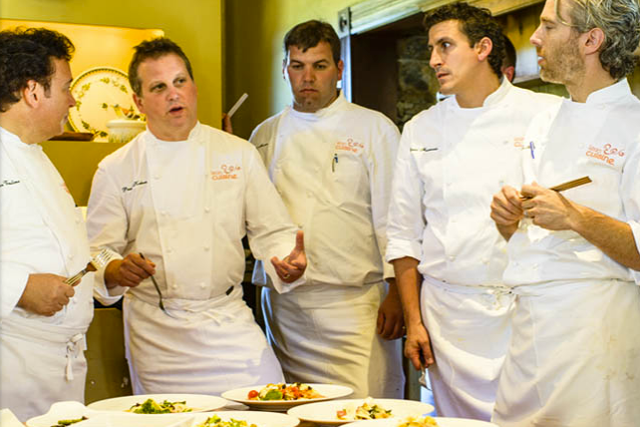Chicago Chefs And 'Big Food'
By Melissa McEwen in Food on Mar 19, 2014 9:55PM
A recent Reader article by Mike Sula highlighted the work some prominent Chicago chefs do with and for larger players in the food industry, from Kraft to Nestle. It explains the mysterious “Chef Grant Achatz's Ham and Curry Toppers" recipe that was briefly hosted on a Kellogg’s website, and why Paul Kahan (of One Off Hospitality) can be found smiling on the back of a Lean Cuisine frozen dinner.
These are industry ties some chefs don’t seem too excited to talk about. As Sula's article explains, one main reason for this is that the consultations these chefs do involve proprietary corporate intellectual property. But there also seems to be some underlying ambivalence about the prospect of chefs who trumpet unprocessed wholesome ingredients from small farms in their restaurants giving advice to companies that seem to sell the polar opposite.
After the article was published, iconoclastic chef Brandon Baltzley, who is in the process of opening TMIP—a restaurant and farm in Indiana—opined on Twitter that, “I'd rather be broke and keep my integrity than rich and feed children food that can't be digested.”
Butcher and Larder’s Rob Levitt, perhaps one of the more surprising industry consultants that the article revealed, said on Twitter that, “I accepted projects I did b/c $ was great but more important, I didn't feel my values were compromised”.
Some chefs featured not only feel that their values are not compromised, but their efforts in the industry have the potential to do good for the world. Moto’s Homaro Cantu is open about his efforts to work with technology to solve world food system problems, citing development of an egg substitute for Hampton Creek Foods as being a potential solution to animal welfare and carbon footprint concerns. Chef Chris Jones went from Moto to work full-time at Hampton Creek Foods, which just launched its first product – an eggless mayo called Just Mayo.
Other chefs have worked with sectors of the larger food industry that are a little bit more innocuous. Sula’s article recounts how Matthias Merges of Yusho worked with manufacturer Polyscience to develop small-scale versions of immersion circulators that have brought the sous vide technique into many home and restaurant kitchens.
What do you think about chefs consulting for “big food?”
